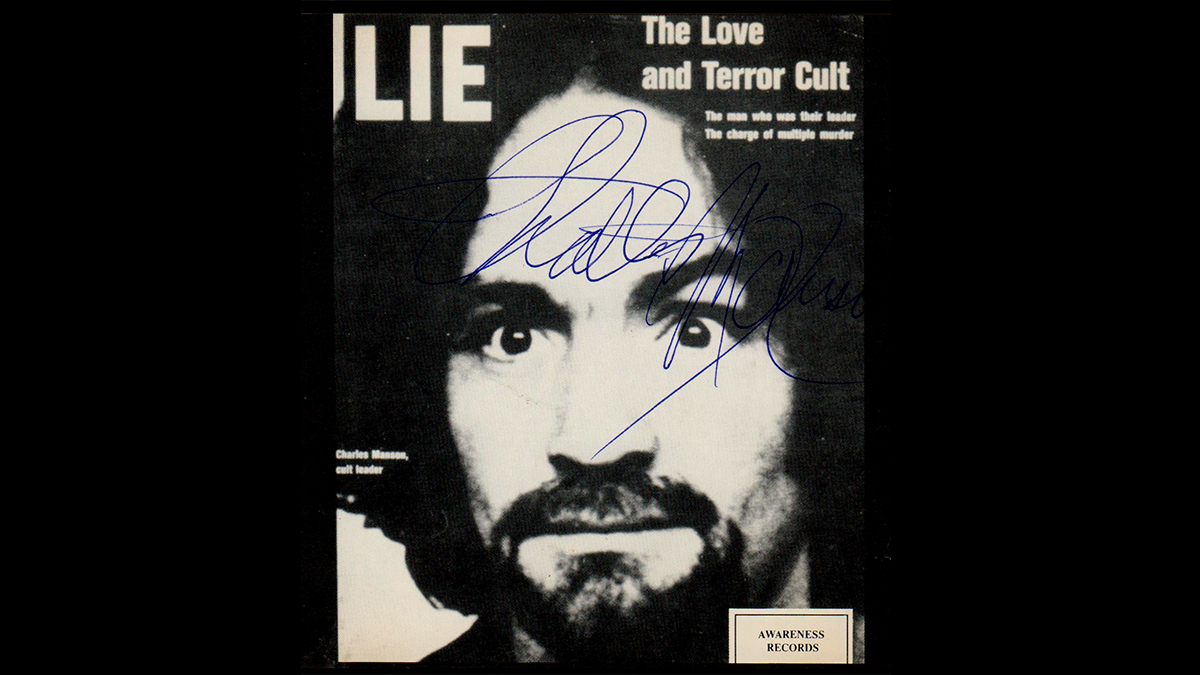If you’ve been watching the newest season of the excellent crime drama, Mindhunter, you might have noticed Holden Ford playing a record of Charles Manson’s recordings. The recordings in question were a series of demos Manson recorded in the summer of 1968, released in 1970 as The Love and Terror Cult. The album was repressed in 1987, when I picked it up as a curio. I’ve scarcely listened to it since, but hearing it on Mindhunter prompted me to dig it out and have a proper listen.
So, what’s it like?
Mostly, pretty ordinary, to be honest. Despite having a heavyweight cabal of LA music movers and shakers behind him, no amount of production can obscure Manson’s deficiencies as a musician. Still, his backers thought that Manson’s skills as a singer and songwriter made up for his clumsy guitar playing.
As a songwriter, Manson shows some range at least: the songs on the album vary from hippy lounge music to spaced-out acid folk. Look at your game, girl sounds like Burt Bacharach as played by an ageing wino busking for booze money. Garbage Dump and Sick City are wryly satirical sketches of Los Angeles.
Arkansas and Big Iron Door are competent enough blues-folk. The latter’s semi-autobiographical nature (Manson spent barely three years of his adult life out of prison, and much of his youth in reform school) lends it a particular strength.
Mechanical man is a pre-Velvet Underground “drone” cacophony of stream-of-consciousness nonsense – basically just Manson gibbering whatever bubbled up into his drug-hazed consciousness, while the Family band wail away in the background. Interestingly, the Family seem to have derived this technique in a similar fashion to the Velvets, who, a few years earlier on the other side of the continent, frequently jammed on “drone sessions” with avant-garde composer La Monte Young. Although, with the Family, there were apparently a lot more drugs, and much less musical skill or theory involved.
The best-known and probably most accomplished song on the album is Cease to Exist, later recorded by the Beach Boys, with slightly altered lyrics and music, as Cease to Resist. Tragically, it seems that Manson’s resentment over the song, and his aborted music career generally, partly led to the selection of the Tate-Polanski home as a site for the “Helter Skelter” killings: record producer Terry Melcher, with whom Manson had fallen out, had previously leased the house.
In the end, the shadow of Manson Family crimes hangs indelibly over the album. It’s impossible to listen to the album without being uncomfortably aware of just who we’re listening to (much like listening to the Glitter Band today). Especially at moments such as the end of People Say I’m No Good when Manson whispers “Kill somebody”. Similarly, the apparently innocent singalong at the end of I’ll Never Say Never to Always is haunted by the awareness that those innocent-sounding girls would, within a year, willingly butcher nearly a dozen people, including the eight-months pregnant Sharon Tate.
It doesn’t help any to try and recall that, when these songs were recorded in 1968, the “general vibe” of the Family, according to biographer Ed Sanders, was relatively benign. Or at least, as benign as a middle-aged con running a stable of teenage girls can be. Manson was, it must be remembered, essentially a pimp. Many of his criminal convictions involved trafficking young girls. In prison, he not only learned guitar from the last survivor member of the Ma Barker gang, Alvin “Creepy” Karpis, but the finer points of procuring and managing a stable of girls.
It was girls, especially underage ones, who were Manson’s “in” to the LA music industry. More important than his musical talents, Manson was able to supply an unending stream of underage pussy; and “perve” as Ed Sanders says, “is what the LA music scene eats for breakfast”.
In the end, this is the real historical interest of this album of mediocre hippy drivel: the shadowy presence of so many music biz and Hollywood big-hitters. A roster of famous names, from Dennis Wilson to Terry Melcher, were intimately involved with Manson and his Family of teenage murder-dolls. At least, until the blood hit the fan.
Whereupon they all retreated behind the walls of their mansions, money and PR agents. Their dalliance with the hippy cult-leader turned murder-svengali was summarily forgotten.
All that’s left to darken the glitter of sunlight on the swimming pools is this collection of 14 rather ordinary songs.

